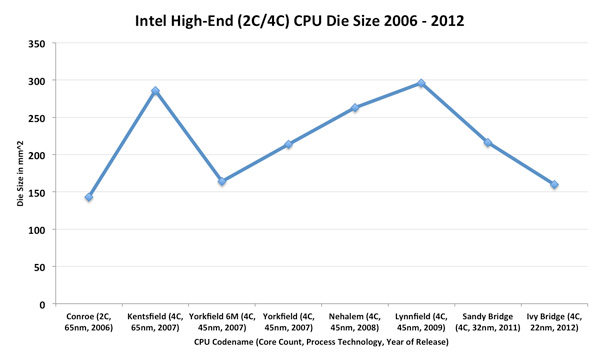Thought some people might be interested in seeing what the potential improvement in gaming is going from an older i7 (the 860) to a new i7 processor (the 3770k). I'm only going to do gaming benchmarks, because that's what I care about and that's all I did on my older i7. I'm doing both clock-for-clock and some moderate OC tests. You can extrapolate from those other levels of OC. The graphics card is an EVGA GTX670 FTW @1215/6500 in all tests.
The settings
(1) i7-860: 159 BLCK with Turbo, translating to 3.5GHz with all cores loaded, or about 4.1GHz in a single thread. HT on.
(2) i7-3770k: either 3.5GHz on all four cores or 4.4GHz on all four cores. Turbo is disabled, HT is on.
Actually, I'll start with a few simple CPU benchmarks I do have:
SuperPi 1M
(1) i7-860 @4.1 on a single core: 10.3s
(2) i7-3770k @3.5: 10.5s
(3) i7-3770k @4.1: 9.0s
(4) i7-3770k @4.4: 8.3s
Clock-for-clock improvement = 14%
OC-for-OC improvement = 24%
IntelBurnTest
This was something I had but had never used as a benchmark, just as a stress test. I'll go ahead and add it for what it's worth.
(1) i7-860@3.5:

I don't have sufficient cooling to run this test on my HTPC. Within seconds it shot to 98C and started throttling. It was running at near 3.5GHz for the few seconds the test ran, however, so this is close enough to compare to the 3770k, and it's consistent with my recollection of prior runs on this CPU when it was in my gaming PC.
(2) i7-3770k@3.5:

(3) i7-3770k@4.4:

Wow, the GFlops results appear to scale entirely linearly with clock speed on the 3770k. Interesting. And I don't know why, but the 3770 is nearly 90% faster clock-for-clock.
The settings
(1) i7-860: 159 BLCK with Turbo, translating to 3.5GHz with all cores loaded, or about 4.1GHz in a single thread. HT on.
(2) i7-3770k: either 3.5GHz on all four cores or 4.4GHz on all four cores. Turbo is disabled, HT is on.
Actually, I'll start with a few simple CPU benchmarks I do have:
SuperPi 1M
(1) i7-860 @4.1 on a single core: 10.3s
(2) i7-3770k @3.5: 10.5s
(3) i7-3770k @4.1: 9.0s
(4) i7-3770k @4.4: 8.3s
Clock-for-clock improvement = 14%
OC-for-OC improvement = 24%
IntelBurnTest
This was something I had but had never used as a benchmark, just as a stress test. I'll go ahead and add it for what it's worth.
(1) i7-860@3.5:

I don't have sufficient cooling to run this test on my HTPC. Within seconds it shot to 98C and started throttling. It was running at near 3.5GHz for the few seconds the test ran, however, so this is close enough to compare to the 3770k, and it's consistent with my recollection of prior runs on this CPU when it was in my gaming PC.
(2) i7-3770k@3.5:

(3) i7-3770k@4.4:

Wow, the GFlops results appear to scale entirely linearly with clock speed on the 3770k. Interesting. And I don't know why, but the 3770 is nearly 90% faster clock-for-clock.
Last edited:
















